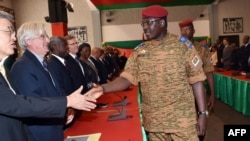The African Union has given Burkina Faso's military a two-week deadline to return power to a civilian transitional government.
The AU Peace and Security Council said Monday that it will not impose sanctions on Burkina Faso for now. But it said the military must hand over power to a civilian government "or else."
Earlier Monday, the country's military leader, Lieutenant Colonel Yacouba Isaac Zida said he would form a unity government and hand over the reins to civilians after just three tumultuous days in power. The announcement followed protests against the army Sunday and threats of sanctions from the international community. There were no reports of unrest Monday in the capital, Ouagadougou.
Compaore resignation
The army took over Friday after the country's longtime president Blaise Compaore resigned and fled to Ivory Coast. He had been in power for 27 years but was pushed out by less than a week of at-times violent street protests when he tried to change the constitution to run again.
“Our understanding is that the executive powers will be led by a transitional body but within a constitutional framework that we will watch over carefully,” Zida told a gathering of diplomats in the capital Ouagadougou Reuters reported, without giving a timeframe. He met with the political opposition on Sunday.
Zida’s spokesman, Colonel Auguste Barry, says the army will hand over power, but this is something that must be settled by dialogue and not by the streets.
“The armed forces never wanted to interfere in politics," he said in French, adding that the other actors in this crisis called on the army to take the lead as chaos threatened the country. He said now is the time for dialogue.
"The army will withdraw and leave power to those who think they are up to task of getting the country through this difficult situation," he added.
Mass protests
The streets of Ouagadougou turned against the military Sunday, as thousands of protesters said the army was hijacking their ousting of Blaise Compaore. They called on interim head of state Zida to step down.
Soldiers dispersed the demonstration and at one point fired on a crowd at the state television station, killing one person.
When he took power, Zida pledged to create a consensual “transitional body” to lead the transition but he gave no details. As Zida now contemplates stepping down, it is unclear whether this transitional body would assume the executive leadership of the country or whether a new civilian leader would be chosen.
Some are calling on Zida to reinstate the Constitution which names the head of the National Assembly as the interim president.




